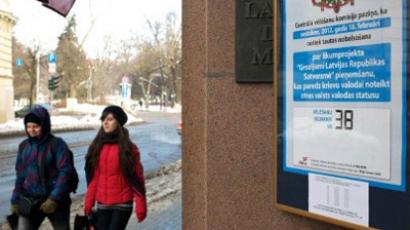Battered Baltic tiger craves a bailout
Just a few years ago Latvia showed rapid economic growth in the forefront of the EU accession, but the recent economic rollercoaster ride has reduced unjustified expectations to begging for a bailout.
The country is now under a three-year, 7.5-billion-euro ($10.3 billion) bailout program adopted by the EU.Unlike in Soviet times, when Latvia had flourishing electronic and automobile manufacturing industries, declaration of independence unhesitatingly made tourism the major source of income, declaring Soviet-era industries a relic of the communist past. As of today, the Latvian economy produces mainly raw materials and low-value goods.Degradation of the production sector has created unemployment and a lack of opportunity, particularly for a rising generation, which in turn has resulted in low birth rates.Whilst there has been a steady influx of tourists to the country, there has also been an increasing outflow of skilled domestic labor. The best brains are fleeing the country, both because of high unemployment and low salaries.Skilled workers started to move to greener European pastures after Latvia joined the EU in 2004, when a free flow of labor within the EU made it easy for Latvians to find better jobs abroad.It is that pull factor which led Sergey to leave his homeland for a job in publishing.A Latvian expat living in the UK, Sergey Petrazhevsky told RT that “It is basically a ghost country really in terms of economics. I was struggling to get a job that would pay 700 pounds. In the UK, even if you’re doing a very average job you still can expect two to three times that.”The global economic crisis corrected the situation even further. Only in the first three months of 2009, the Latvian economy fell 18 per cent, EU's biggest registered fall. That happened against 2008 statistics that registered Latvian purchasing power standard per capita at only 56 per cent of the EU average.Even the 5.5 per cent GDP growth registered in 2011 has not brought Latvia to pre-crisis levels.And that is when the real exodus from the country began.After leaving Latvia, many fail to return owing to low wages and unemployment mixed with a poor social welfare system.It is a situation most acute outside the country’s glitzy tourist centers.In Latvia’s capital Riga, just a two-minute drive from the picturesque old town brings one to neglected quarters within the city’s boundaries. The striking contrast here epitomizes the lack of investment outside of key tourist hubs, one that is blighting the prospects of a younger working generation.Outside of Riga, life is even bleaker. In the coastal town of Jurmala, neglected housing estates have become dens of unemployment – with many dreaming of a new life abroad.“The problem is where to get money. Many of my older friends have already left. And I’m graduating from school very soon. Don’t know if I’ll stay here after that,” one young man told RT.With the demand for jobs abroad agencies have sprung up around Latvia. Manual labor is what awaits many who leave, regardless of their educational backgrounds.“Seventy per cent of our recruits are going to Britain and to the agricultural, horticulture, forest and food industry. Mostly doing jobs that local people aren’t keen to do. You know: all hard work, night shifts, tough industry,” Ginters Purins director of GP Recruitment, revealed to RT.Over the past decade Latvia’s population has plummeted by almost one sixth, now hovering just above 2 million. When Latvia declared independence from the Soviet Union in 1991, its population was around 2.7 million.But even with an annual exodus around 30,000, many think the real figure is worse.“I’m afraid to say the real data is not a little above 2 million but only 1.9 million,” confessed Ilmars Mezs, the head of the Latvian office of the International Organization for Migration. “Most of those [people] are Latvians who are not willing to leave, but have to because for the last couple of years they were unable to find any work but they still have families to feed.”That situation has left growing waves of Latvians making imprints abroad. And leaving those from all walks of life struggling to see any signs of hope on the horizon.














